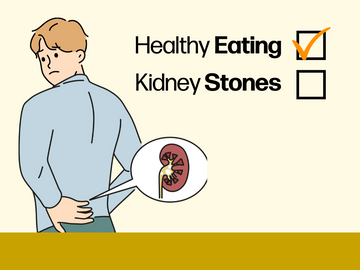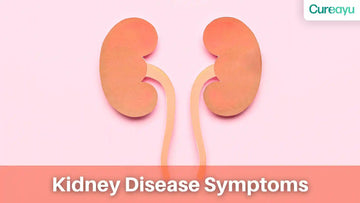Have you ever heard of a kidney stone? If so, you know they’re far from fun. Kidney stones can be painful and lead to further health complications if not managed and prevented properly. That’s why it’s important to understand the diet-related causes of kidney stones.
If dietary changes are necessary, don’t worry—healthy eating doesn’t have to be difficult. In this article, we’ll cover what causes kidney stones and how to prevent them through healthy eating habits. You’ll also learn about the different types of kidney stones, which foods you should avoid, and foods that are beneficial for preventing kidney stones. Let’s get started!
Common Causes of Kidney Stones
There are two primary dietary culprits when it comes to kidney stones:
- Eating a diet rich in sodium and animal proteins: Sodium and animal proteins can cause a buildup of calcium in your kidneys, which can often lead to kidney stones. You might think that means you should reduce your intake of sodium and protein – but not so fast. While reducing salt and certain types of meat is important, it’s also important to get adequate amounts of these nutrients to prevent kidney stones.
- Insufficient hydration: Not drinking enough water can cause a decrease in urine volume, raising the concentration of minerals that form kidney stones, like calcium and oxalate. So drinking plenty of water every day – about 8 glasses, or 2 liters – is key to preventing kidney stone formation. An overall balanced diet that includes plenty of fresh fruits and vegetables is also important for avoiding kidney stones. Dietary fiber found in plant foods helps reduce the risk for stone formation by binding with fatty acids to slow down their absorption into the body, thereby reducing calcium excretion in the urine.
Also Read: Managing Kidney Stones: Insights, Medications, and Ayurvedic Approaches
Diet Changes to Lower the Risk of Developing Kidney Stones
Cutting down on the amount of sodium, animal protein, and oxalate-rich foods in your diet can go a long way toward reducing your risk of kidney stones. We know it’s hard, but try to cut out processed foods as well as those high in sodium, like cured meat, cheese, and instant noodles.
- Increase Calcium Intake – Increasing the amount of calcium in your diet is also a good idea. This will stop oxalates from binding together and forming kidney stones. Foods high in calcium include dark leafy greens, dairy products like milk and yogurt, nuts and seeds, beans, sugar-free fortified orange juice, certain fish like sardines and salmon with bones, and tofu.
- Choose Low-Oxalate Fruits & Vegetables – To keep oxalate levels low where possible, try to choose low-oxalate fruits and vegetables such as apples (without skin), oranges (without skin), bananas, blueberries, and strawberries. As for veggies, try cauliflower, cabbage, onions (raw or cooked), green beans, or carrots; just be sure to check the nutrition label for oxalate content before purchasing any produce!
By making these simple changes to your diet now, you can lower your risk of getting kidney stones in the future, which is definitely worth it!
Foods to Eat When Managing Kidney Stones
If you’re looking to manage and prevent kidney stones, then it’s important to know what kinds of food to eat. Generally speaking, you’ll want to increase your intake of fruits and vegetables while reducing the number of processed foods, added sugars, and animal proteins that you consume. Some other foods may be beneficial for people who have had kidney stones before.
Also Read: गुर्दे की पथरी: एक खतरनाक समस्या
Appropriate Water Intake
Finally, drinking plenty of water is important for managing and preventing kidney stones since fluids help flush out unwanted toxins in the body—including those that could lead to stone formation. Make sure you drink at least eight glasses of water per day—even more if you’re physically active or live in a hot climate!
Vitamin B6
Vitamin B6 helps reduce oxalate levels in the body, which can help reduce the risk of kidney stone formation. Foods like bananas, salmon, turkey, and potatoes are all good sources of vitamin B6 that you may want to incorporate into your diet if you’ve had kidney stones before.
Calcium-Rich Foods
The biggest culprit in kidney stone formation is high levels of calcium oxalate in the urine. Eating calcium-rich foods can help balance out the calcium oxalate in your urine and reduce the likelihood of forming a stone. Dairy products like milk, cheese, yogurt, and kefir are all sources of calcium that can be beneficial for people who are prone to developing kidney stones. Almonds, broccoli, kale, and white beans are also good sources of calcium.
Foods to Avoid When Managing Kidney Stones
When it comes to managing kidney stones, certain types of food should be avoided. Eating too much of these can worsen kidney stone symptoms and increase the risk of developing new stones. So what should you watch out for?
High-Sodium Food
High-sodium foods such as processed meats, canned soups, fast food, and snack foods can increase the risk of kidney stones. This is because sodium increases calcium levels in the urine, which may lead to the formation of stones. In addition, salty snacks contain chemicals that can irritate the kidneys and bladder walls which could cause pain and discomfort.
Animal Protein
Eating too much animal protein, such as red meat, has been linked to an increased risk of developing kidney stones. Meats are high in uric acid and purines, which are known to increase the formation of uric acid stones in the kidneys.












